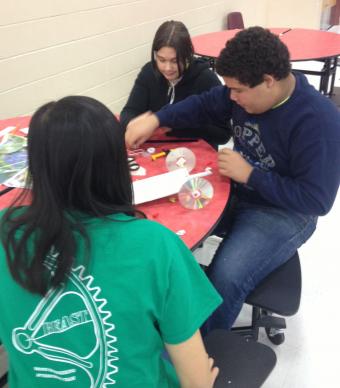PROVIDENCE, R.I. [Brown University] — Not all high school students bolt for the door when the final afternoon bell rings. Each Thursday, students from a Providence high school stick around into the evening to earn class credit and learn engineering concepts from Brown University students.
The after school class is part of a partnership between students in Brown’s School of Engineering and the Providence After School Alliance (PASA), a public-private organization aimed at improving out-of-school learning opportunities for Providence youth. The partnership started in 2011, when a group of engineering students was looking for a way to help out in the community. Through Brown’s chapter of Engineers Without Borders, the students met with representatives from PASA, and the result was BEAST: the Brown Engineering After School Team.
The team designs curricula and teaches two-hour classes after school for students from Dr. Jorge Alvarez High School and the Juanita Sanchez Educational Complex. On Thursdays this semester at Alvarez, the team is teaching a class called “Crash Course,” in which the students build their own small model cars. Using a variety of materials — foam board, straws, rubber bands — the students make small, elastic powered cars. In the process, they learn basic scientific and engineering concepts like friction, torque, power-to-weight ratios, and others. Another class, taught in conjunction with students from Brown's Computer Science Department, teaches the basics of developing apps for Android phones.
The students earn credit for the classes on their high school transcript and a digital badge. Digital badges are a credentialing system that enables students to demonstrate to employers or college admissions officers specific skills that they’ve learned.
“I like teaching to high school students,” said Jie Ying Wu, a third-year engineering student and one of the group’s leaders. “I joined [BEAST] because I was looking for an engineering outreach program, and this seemed fun. I like that we plan the lessons, so we have to learn how to do everything beforehand. And it’s engineering I wouldn’t otherwise get to do, which makes it fun.”
Crash Course is the fourth class the BEAST students have developed and taught. Their first, introduced in the spring of 2012, taught students to use an electronics platform called Arduino to build flashing LED cubes. In a class held in fall 2012, students designed and built fully functional bicycles. Last semester, students learned about the basics of flight by building and testing their own hand-launched gliders.
The classes have been incorporated into the HUB, PASA’s after school program for high schools. Each course is hands-on, interactive, and must meet Rhode Island Common Core standards for teaching scientific concepts.
Over the course of the BEAST program, 42 high school students have taken engineering classes, with many students taking more than one class. Another 40 have participated in “design challenge” events related to the curricula held periodically throughout the year.
Lisa Sampson, HUB coordinator with PASA, said she’s impressed with the Brown students’ efforts to become good teachers.
“The Brown group came with expertise in the content, but they didn’t necessarily come with much experience working with kids,” Sampson said. “So what they did that was so impressive was put the time and effort into going through baseline youth development training through PASA. Every step along the way they’ve seized the opportunity to get professional development. They’ve taken our program quality assessment observations and used that feedback in their program.”
BEAST has been funded by Brown through an UTRA (Undergraduate Teaching and Research Award). Rob Rome, associate dean in the School of Engineering, is impressed with the work the students have done so far and will work with the students to expand their efforts.
“A large part of the growth of the School of Engineering involves working more closely with the Providence community,” Rome said. “These students are ambassadors of the school to local students and also fulfill the greater need of exposing kids to what engineering and science are all about. BEAST has the full support of the school to grow its activities.”
Christy Chao, a fourth-year engineering student who has been with BEAST from the beginning, said she’s excited to see how the group will grow.
“I think it’s a great program to be involved in because [we] learn just as much from the students as the students learn from our program,” Chao said. “Working with these students has really been a great experience and I can't wait to see what they go on to do next.”
The group’s PASA partners are looking forward to it too.
“I can’t say enough about this group,” Sampson said. “They’re one of our longest-standing, most reliable and high-quality partners.”

